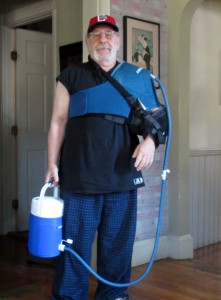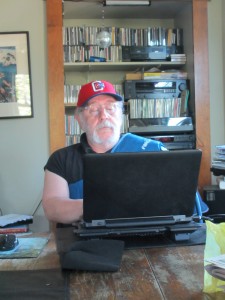Hard to say which was the most challenging part of my rebirth as an author after twenty years: writing the fourth book in the Matt Jacob series, TIES THAT BLIND, or getting up for presentations at bookstores and other events. Well, it took a couple outings to finally get legs under me. I had a lot of rust to shake loose. But as I imply in my title, I think I’m back.
 This past weekend Susan and I attended the Newburyport Literary Festival as authors and I gotta say, it was a great weekend. Susan had a solo presentation, as did I.
This past weekend Susan and I attended the Newburyport Literary Festival as authors and I gotta say, it was a great weekend. Susan had a solo presentation, as did I.
 But first I was on a panel with two other crime writers, Rory Flynn and Elisabeth Elo.
But first I was on a panel with two other crime writers, Rory Flynn and Elisabeth Elo.
An extra bonus–Jason Pinter, founder of Polis Books (aka my publisher and editor) was invited to be the panel’s moderator. We finally had the chance to meet in person after a year of two of telephone and email conversations.
 He’s an incredibly sweet man (and believe me, I’m a not easy on publishers given my writing history). Jason is an author himself, which gives him a sensitivity toward his writers that makes him a pleasure to work with.
He’s an incredibly sweet man (and believe me, I’m a not easy on publishers given my writing history). Jason is an author himself, which gives him a sensitivity toward his writers that makes him a pleasure to work with.
 Even though I was there as an author, being on the panel also gave me a lot to think about in terms of writing. When I began to write detective fiction oh so many years ago, I stopped reading other mystery writers’ books. I worried that other authors’ ideas or attitudes would seep into my head and I’d somehow use them without even realizing it. But after almost twenty years working in the law world, I’ve come to appreciate due diligence. This time around, whenever I’ve had an appearance with other authors, I’ve read their latest books. And listened very carefully to what they say about how they try to make their stories come alive.
Even though I was there as an author, being on the panel also gave me a lot to think about in terms of writing. When I began to write detective fiction oh so many years ago, I stopped reading other mystery writers’ books. I worried that other authors’ ideas or attitudes would seep into my head and I’d somehow use them without even realizing it. But after almost twenty years working in the law world, I’ve come to appreciate due diligence. This time around, whenever I’ve had an appearance with other authors, I’ve read their latest books. And listened very carefully to what they say about how they try to make their stories come alive.
Rory spoke intensely about his vision that “place” is an actual character in his book, THIRD RAIL. And he’s right, his Boston is a multifaceted living entity, an important player within his story. Elisabeth spoke about the depth of her research into the South Boston fishing community. Her ability to turn that research into reality opened my eyes. As someone who lives and writes primarily from inside his own head, it was a pleasure to think about other ways artists approach their work and consider how to integrate them into my own methods.
 The Festival took place in many different locations throughout beautiful Newburyport, a coastal New England town dating back to 1764. My solo do took place at the Jabberwocky Bookshop, always a bonus to appear at an independent bookstore. I arrived early and when I saw just a sprinkle of people there, I considered tossing my presentation, and inviting folks into a roundtable discussion. Impatient me. By starting time, a good number of people had turned out, including a local friend and a good friend’s sister and her husband. I was pleased they came to this particular presentation because it was the best yet. I guess I’m officially out of retirement.
The Festival took place in many different locations throughout beautiful Newburyport, a coastal New England town dating back to 1764. My solo do took place at the Jabberwocky Bookshop, always a bonus to appear at an independent bookstore. I arrived early and when I saw just a sprinkle of people there, I considered tossing my presentation, and inviting folks into a roundtable discussion. Impatient me. By starting time, a good number of people had turned out, including a local friend and a good friend’s sister and her husband. I was pleased they came to this particular presentation because it was the best yet. I guess I’m officially out of retirement.
Before I finish I want to say a few words about the Newburyport Literary Festival. Of course Sue and I were delighted to be invited, but there’s more than that. We’ve all been to conferences and festivals before, going from one presentation to another without much thought of the work it takes to have them there. This time I was very aware of how many months of planning, inviting, and replacing it took for the steering committee to pull the Festival off. And then the endless running around on the day itself to make everything look effortless.
Somethings you just can’t plan for. My panel was located in the Fire House Arts Center, and as I was consulting my map to walk there I saw firetrucks with flashing lights. How cool, I thought to myself. They actually got firetrucks to signal the location to those of us unfamiliar with Newburyport. Actually they had been called because there was a minor gas leak in the building. Nobody could enter until National Grid signed off on the fix. I’m in the clutch of people trying to be warm, hoping the firemen had a different telephone number than I have for National Grid, or they AND the panel hold be on hold forever.
Luckily they did. And members of the steering committee and a serious cadre of volunteers were able to keep the audience rallied while waiting in the outdoor chill and kept the event on track.
Thank you Sherri Frank of the steering committee for inviting us to this tenth anniversary experience and thank you all for coming out. Thank you my compañeros for your insights, and thank you Jason for not asking me to write Matt Jacob into a 12 Step.




